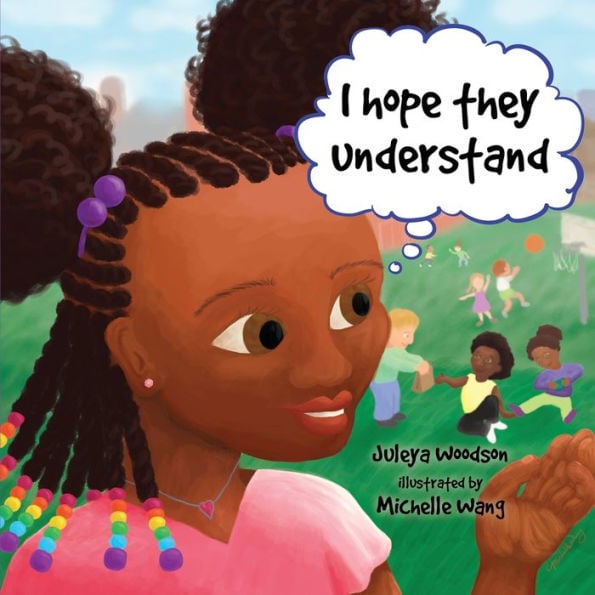Evanston resident publishes children’s book celebrating racial and cultural diversity

“I Hope They Understand” by Juleya Woodson. Woodson, a longtime Evanston resident, said she was inspired to write a children’s book that celebrates racial and cultural diversity.
May 11, 2021
For as long as she can remember, Juleya Woodson has wanted to write a book.
After seeing how Black children were affected by the country’s reckoning with racial injustice last summer, the Evanston resident funneled her feelings into a children’s book, “I Hope They Understand.”
“With everything going on in our world, after Breonna Taylor and George Floyd… I felt like the media was sending a message that Black is not beautiful,” Woodson said. “That was my motivation.”
Woodson is a family support specialist at Childcare Network of Evanston and a graduate of Evanston Township High School. She said her experience working with children up to age five, as well as with raising her two-year-old son, made her realize how insecure Black children felt in the summer of 2020.
Woodson said she wanted the book to act as a “conversation starter” for children so they could recognize and celebrate racial and cultural diversity. She said children look up to their parents and notice when there is something wrong — and this was especially true last summer.
To her, it’s vital for all kids to be able to see themselves in the books they read, Woodson said. Her book highlights the characteristics of a Black child, from the eyes to the lips, reminding Black children of their beauty while educating others.
“It’s about helping Black kids feel beautiful, but also opening the conversation for other kids to ask those questions and not be afraid to talk about the differences they noticed,” Woodson said.
The book also includes affirmations for the children to recognize that though their skin may look different from others’, it is still beautiful.
Woodson remembered not feeling beautiful as a child because beauty was portrayed as “lighter skin, thinner bodies and long, thin hair.” Her experience is not unique — she said many children internalize the feeling of lacking beauty at as young as three years old.
“Even as a toddler, they start to classify and categorize people,” Woodson said. “And by three-and-a-half to four years old, they’re starting to add value to their environment and internalize racism and superiority.”
Woodson said the writing and publishing process was less difficult than she thought it would be. After searching for publishers who had released books similar to “I Hope They Understand,” Woodson said she reached out to one who was excited to work with her.
Woodson also needed an illustrator for the book. After posting a call for help on Facebook, her college friend and graphic designer, Michelle Wang, reached out.
Although Woodson had specific visions for some of the pages, Wang said she still had creative reign with others parts of the book. Wang mainly works on logos and brochures for companies and said she enjoyed the change of pace.
“It was fun to get away from corporate colors and do something fun and playful and colourful,” Wang said. “It’s important for all kids to recognize that they are beautiful creatures.”
She also said she admires Woodson’s spark that “spurs her on to accomplish great things.” Wang said unlike others, Woodson works to make her dreams a reality.
Another of Woodson’s college friends, Kempton Freeman, agreed that Woodson’s book is essential in the context of current cultural conversations.
“Even though we are different, we are the same in the confines of being humans,” Freeman said. “I had to support (Woodson) and make sure that I definitely put it out there to the universe to support her as well.”
A cultural advisor in a Wisconsin school district, Freeman shared the book with a kindergarten class. After reading the book, Freeman said the children drew pictures of themselves and discussed the importance of their uniqueness.
Ultimately, Woodson hopes to expand on her literary debut, eventually turning “I Hope They Understand” into a series of books. She also wants the series to turn into a movement that helps bridge the racial wealth gap. She plans to create a website focused on educating and inspiring community members, with useful articles, blogs and motivational speakers.
“Things won’t completely change unless we meet our kids where they’re at because they’re the next leaders and the purest souls right now,” Woodson said. “They care nothing about race or color, and we need to keep it that way.”
Email: [email protected]
Twitter: @laya_neel
Related Stories:
— Author Garth Greenwell discusses his book on queer love
— Scholar donates collection of American Indian and Indigenous books and texts to NU
— Bookends & Beginnings files class-action suit against Amazon, becoming face of new antitrust battle

